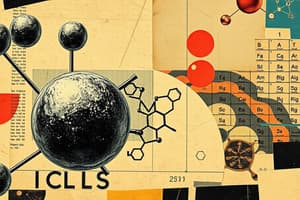Podcast
Questions and Answers
What type of bond forms between atoms when they share electrons?
What type of bond forms between atoms when they share electrons?
- Ionic bond
- Covalent bond (correct)
- Van der Waals bond
- Hydrogen bond
Which chemical equation represents the burning of methane?
Which chemical equation represents the burning of methane?
- CH4 + O2 -> CO2 + H2O
- CH4 + 3O2 -> CO2 + H2O
- CH4 + 4O2 -> CO2 + H2O
- CH4 + 2O2 -> CO2 + H2O (correct)
What determines the properties and behavior of matter?
What determines the properties and behavior of matter?
- Interstate forces
- Intergalactic forces
- Chemical equations
- Intermolecular forces (correct)
Which fundamental properties of matter include its state and temperature?
Which fundamental properties of matter include its state and temperature?
What did Alexander Fleming synthesize in the 1920s that revolutionized medicine?
What did Alexander Fleming synthesize in the 1920s that revolutionized medicine?
What is the fundamental unit in chemistry that comes together to form molecules?
What is the fundamental unit in chemistry that comes together to form molecules?
Which of the following elements indicates the number of protons in an element's nucleus?
Which of the following elements indicates the number of protons in an element's nucleus?
What is the chemical formula for water?
What is the chemical formula for water?
What is the purpose of organizing elements in the periodic table?
What is the purpose of organizing elements in the periodic table?
When do chemical reactions occur?
When do chemical reactions occur?
Study Notes
Exploring Science: A Journey through Chemistry and its Wonders
In the vast expanse of human knowledge, science stands out as our quest to understand and explain the world around us. One vital branch of this pursuit is chemistry—the study of matter, its composition, and the changes it undergoes when interacting with itself or other substances. Let's embark on a journey through the wonders of chemistry and its indispensable role in our understanding of science.
Atoms and Molecules: The Building Blocks of Chemistry
Atoms, the smallest units of elements, are the fundamental building blocks of all matter. They come together in various combinations to form molecules, which are the fundamental units in chemistry. For instance, water (H2O) consists of two hydrogen atoms bonded with a single oxygen atom, while a sugar molecule is a complex configuration of carbon, hydrogen, and oxygen atoms.
The Periodic Table: Organizing Elements
The periodic table is a chart that displays the elements arranged in order of their atomic number. Each element has a unique atomic number, indicating the number of protons in its nucleus. This organization allows chemists to understand patterns and trends within the elements, making it easier to predict their properties and reactivity.
Chemical Reactions and Equations
Chemical reactions occur when atoms and molecules rearrange themselves, forming new substances. Chemists represent these transformations using chemical equations, which show the reactants, products, and the balanced stoichiometry (quantities) of the substances involved in the reaction. For example, the burning of methane (CH4) is represented by the chemical equation:
[ CH_4 + 2O_2 \rightarrow CO_2 + 2H_2O ]
Bonding and Intermolecular Forces
Chemical bonds form between atoms when they share or transfer electrons, resulting in either covalent bonds or ionic bonds. These bonds cause atoms to form molecules or ions, which can then interact through various intermolecular forces. These interactions, such as hydrogen bonding and van der Waals forces, determine the properties and behavior of matter.
Properties of Matter and Phase Changes
Matter possesses several fundamental properties, including its state (solid, liquid, gas), color, texture, and temperature. Phase changes occur when matter transforms from one state to another, such as water freezing to ice or boiling to steam. These changes involve alterations in the motion and arrangement of particles within the substance.
Applications of Chemistry
Chemistry has a wide range of applications in our daily lives, from the production of food and medicines to the development of new materials and technologies. For instance, chemists helped to develop polymer materials, such as plastics, which have revolutionized modern living, while the synthesis of penicillin by Alexander Fleming in the 1920s ushered in the era of modern antibiotics.
Conclusion
Chemistry is an indispensable branch of science that helps us understand the fundamental nature of matter and its interactions. From atoms to molecules, the periodic table, chemical reactions, and intermolecular forces, chemistry provides us with the tools to comprehend the world around us and develop innovative solutions to pressing global challenges. As we continue to explore and discover new frontiers in our understanding of chemistry, we can expect to see even more exciting developments in this vital field of science.
Studying That Suits You
Use AI to generate personalized quizzes and flashcards to suit your learning preferences.
Description
Delve into the fascinating world of chemistry, from the foundational concepts of atoms and molecules to the practical applications influencing our daily lives. Explore the periodic table, chemical reactions, bonding, phase changes, and the diverse uses of chemistry in various industries and innovations.




